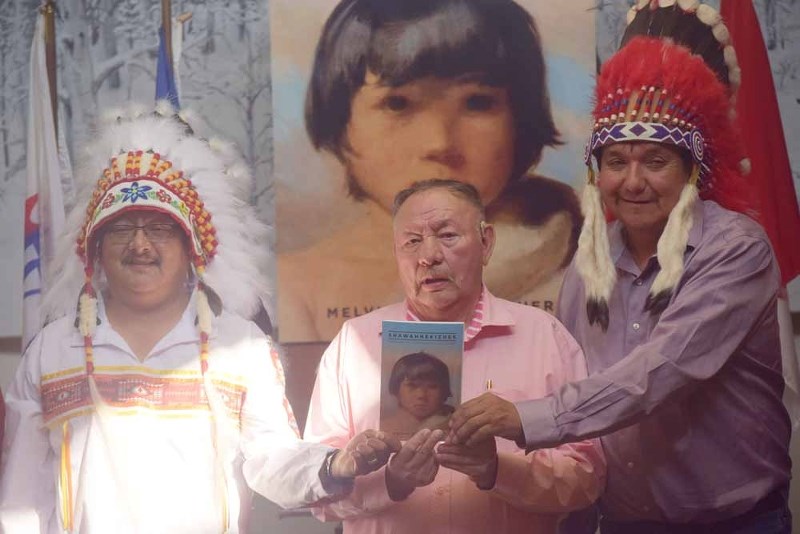Melvin Steinhauer decided to write a book about his great grandfather Reverend Henry Bird Steinhauer for many reasons.
One of those reasons was to fulfill a wish of his late father Harry W.J. Steinhauer.
“He really wanted someone to write a book about his grandfather so I decided to take a crack at it,” said Melvin to the crowd that attended a book launch at the Whitefish Lake First Nation administration office on Friday.
Another motivation for Melvin to write the book was because there is a dearth of written accounts of First Nations stories and events.
“The lack of Indian history prompted me to take a very serious look at what I may have to offer in terms of the history of my inheritance and the inheritance of the most precious history of my home and native land of Whitefish Lake Reserve.”
Giving readers a factual picture of who First Nations people really are is a prime objective of his book.
“I want the whole world to know that there are no savages, warriors with feathers and war bonnets. People have been misled by Hollywood movies to believe a misconception of what Indians are.”
The name of the book is Shawahnekizhek: Henry Bird Steinhauer: Child Of Two Cultures. The word “Shawahnekizhek” means, “blue skies” or “tear skies” in Ojibwa. It was one of Henry Bird Steinhauer’s names. The front cover picture features a more than 200-year-old painting of Steinhauer as a child.
“That child grew up to be the first Aboriginal missionary in Alberta,” Melvin explained.
Steinhauer established his Christian mission in Whitefish Lake in 1854.
“He brought the plough and the hammer to Whitefish Lake as well as the word of God. He gave sermons and taught school in Cree and English.”
He also founded the first Protestant church in the region in 1864.
Shawahnekizhek also initiated agriculture and gardening practices in the Whitefish Lake community in order to help his people survive any change to the area.
The Reverend was also handy with tools. He helped the people transition from living in teepees to living in sturdy cabins. He introduced the wooden gardening plough to the area to help lead to productive harvests.
Melvin says that people that read the book will learn that his great-grandfather considered himself a child of both the Native and European cultures.
Readers will also learn about Shawahnekizhek’s upbringing near Lake Simcoe on the Rama Indian Reserve, and then his journey to become an ordained minister.
That desire to become a minister took him to England. Melvin says that Henry Bird Steinhauer “was probably the first Canadian Indian to visit London.”
Shawahnekizhek had to face some adversity on his journey to ordination. While his white colleagues were ordained after four years of education, it took Henry Bird Steinhauer 14 years to get to his ordination day.
“He was a man that stumbled and fell but always got up again,” said Steinhauer. “He never gave up on his values or his God.”
His life experiences and education gave the Reverend tremendous wisdom. Leaders of that time would come to him for counsel. A significant occasion where Henry Bird Steinhauer was called upon to be an advisor was at the outbreak of the North-West Rebellion in 1885.
“[Whitefish Lake] Chief Pakan came to Henry Bird Steinhauer for advice and the advice that he gave Pakan was not to get involved in the rebellion. He made the chief understand that getting involved would lead to trouble for his people.”
The conflict ultimately led to hundreds of deaths.
The Reverend’s legacy at Whitefish Lake Reserve is still huge today. Melvin estimates that “ninety per cent of the people on the reserve” are Shawahnekizhek’s descendants. Melvin says Henry Bird Steinhauer’s “legacy of peace and leadership” is also still being felt.
It took nearly 14 years for Melvin to complete the book about his great-grandfather, as it took a lot of time to find different written material from across Canada to help him tell the story. The written accounts and the maps that he has acquired is enough to help him write a second book. He plans on writing a complete history of the Whitefish Lake First Nation.
To order a copy of Shawahnekizhek: Henry Bird Steinhauer: Child Of Two Cultures, you can email Melvin at [email protected].



